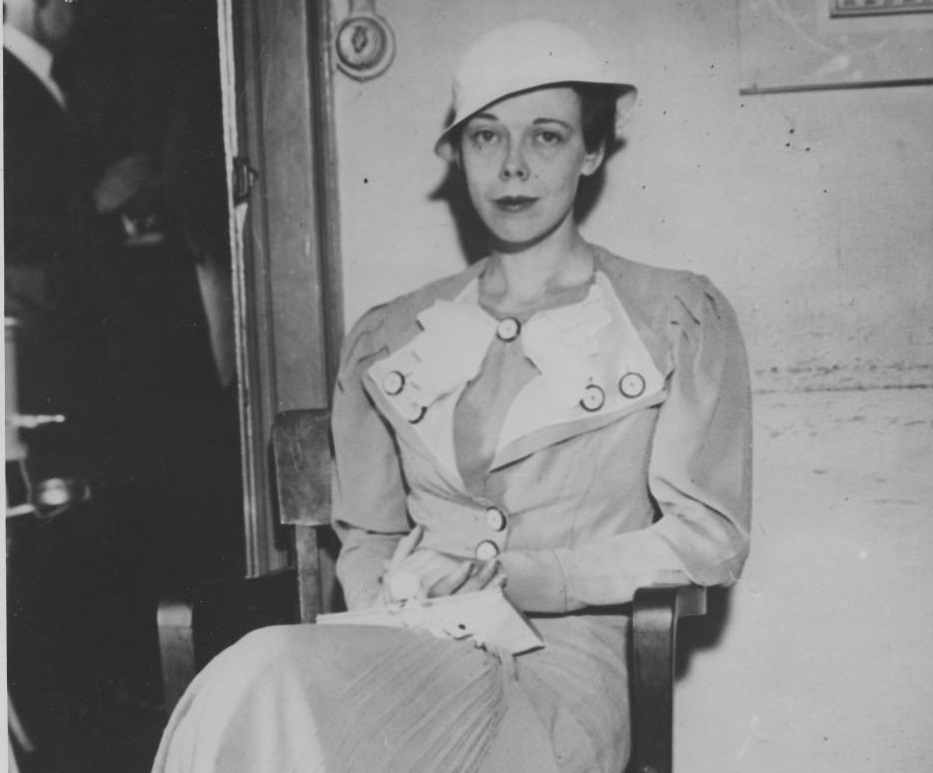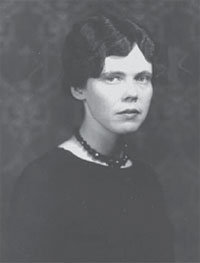Kidnapped!
One of Kansas City's most sensational and ultimately tragic crimes began on May 27, 1933 with the kidnapping of Mary McElroy, the daughter of controversial city manager Henry F. McElroy, who had close ties to the political machine operated by “Boss” Tom Pendergast. She was released after 34 hours of captivity, following payment of a $30,000 ransom, but she never recovered from the emotional turmoil that ensued. In the appeals that resulted from the incident, the U.S. Supreme Court upheld the death penalty as a legally acceptable form of punishment for kidnappers.

Mary McElroy was born in 1907 to Marie and Henry McElroy. As a child, she grew up in a very sheltered environment, but nonetheless was raised by her father to be self-reliant and headstrong. After her mother's death in 1920, she took it upon herself to care for her father. A close personal relationship blossomed between them, and Mary continued to live with her father even after she reached adulthood.
Henry McElroy had moved to Kansas City from Chicago in 1895, at the age of 30. Previously a store clerk, he eventually developed connections with the Pendergast machine and in 1922 secured an appointment as judge of the western district of the Jackson County Court, an administrative, not a legal position. In 1926, "Boss" Tom Pendergast used his influence with five city council members to ensure that McElroy was hired as Kansas City's city manager, a new position recently approved by voters.
With the support of the Pendergast machine, McElroy became one of the most powerful people in the city and even the state of Missouri. As manager, McElroy brought Kansas City the Municipal Airport in 1927, eliminated tolls on two bridges over the Missouri River, and enacted a "ten-year plan" of public improvements that resulted in the construction of a new City Hall, Jackson County Courthouse, Municipal Auditorium and the paving of the Brush Creek streambed, projects that required massive quantities of concrete supplied by one of Pendergast’s companies. Meanwhile, Mary maintained an outspoken pride in her father's deeds.
While many of McElroy's accomplishments were widely considered to be great improvements to the vitality of the city, his methods came into question as the 1930s progressed. His connections to machine politics and a criminal underworld headed by mobster John Lazia became obvious. Worse still, he came under fire for perceived mismanagement of public funds, a practice McElroy regularly referred to as “country bookkeeping” and also was suspected of engaging in bribery.
It was in this environment on May 27, 1933 that Mary McElroy was kidnapped by four inexperienced and unknown criminals who were inspired by national headlines of successful kidnappings. While Mary was bathing that morning, two of the accomplices, Walter McGee and Clarence Stevens, approached the front door of the McElroy home. Dressed as deliverymen, they tricked the cook, Heda Christensen into opening the door for them. Armed with revolvers, they marched upstairs and took Mary hostage (after they allowed her a few minutes of privacy to get dressed in a pink cotton frock, tan hose, and white shoes). They took her to a house near Shawnee, Kansas, where they handcuffed her to a wall in the basement.
The kidnappers did not harm Mary, as she maintained composure and appeared to be in good spirits. In a turn of events that would later capture the public's imagination, she befriended her kidnappers. At 9 o’clock the next morning, they received the $30,000 ransom and released Mary near the Milburn Golf Club. They even gave her a fare to pay for transportation back to her home.
Three of the four accomplices were soon arrested. Walter McGee was sentenced to death, the first time in the United States that such a harsh penalty had ever been exacted for a kidnapping. George McGee, the younger brother of Walter, received a life sentence. Clarence Click, owner of the Shawnee property where Mary McElroy was held captive, was sentenced to eight years. After Walter McGee's appeals reached Supreme Court, the sentence of death was upheld.
Henry McElroy, still outraged at the kidnapping, was pleased with the harsh sentences. Mary McElroy, however, sunk into a deep depression. In principal she agreed that the death penalty was appropriate for kidnappers, but in her particular case she took sympathy on her kidnappers and could not bear the idea of Walter McGee being executed. Rumors and news headlines circulated both locally and nationally that she and Walter had been in a romantic relationship, although this was probably not true. Mary convinced her father to help her obtain a stay of execution from the Missouri governor. They were successful in commuting McGee's sentence to life in prison.

Unfortunately, many of the remaining years of Mary McElroy's life were unhappy. She continued to feel sorry for her kidnappers, and frequently visited them in prison. She was devastated when her father was forced to resign as city manager on April 13, 1939, following the downfall of Tom Pendergast. Henry McElroy died shortly thereafter, on September 15, 1939, at the age of 74. Mary never managed to adjust to life without her father and continued to feel pressure from the members of the media who were eager to capitalize on stories of her "romance" and the plummeting political legacy of her father. The pressures ultimately became too much for her, and on January 20, 1940, she committed suicide. For Mary McElroy, the kidnapping saga was over, but everyone else continued to wonder about the strange details of May 27, 1933.
Read a full biographical sketches of people involved in the Mary McElroy kidnapping, prepared for the Missouri Valley Special Collections, the Kansas City Public Library:
- Biography of Mary McElroy (1908-1940), Kidnap Victim, by Barbara Magerl.
- Biography of Henry Francis McElroy (1865-1939), City Manager, by Nancy J. Hulston.
- Biography of John Lazia (1896-1934), Crime Figure, by Daniel Coleman.
- Biography of Thomas Pendergast (1873-1945), Business Owner and "Political Boss," by Susan Jezak Ford.
View images relating to Mary McElroy that are a part of the Missouri Valley Special Collections:
- County Line Road Residence where Mary McElroy was held captive
- Lou Holland, Henry McElroy, and Other Men
- Henry McElroy, Jr.; at the Municipal Airport Terminal Building Groundbreaking Ceremony
- Prominent Kansas Citians; H.F. McElroy, M. Mumford, William R. Nelson, Albert I. Beach
- Henry McElroy at the 1928 Republican National Convention
- Henry McElroy near an airplane
- Henry McElroy, Sr.
Check out the following books and articles about the Mary McElroy kidnapping, held by the Kansas City Public Library:
- Tom's Town: Kansas City and the Pendergast Legend, by William M. Reddig, 1947, pp. 247, 255-256, 263, 340-353.
- "The Tale of Mary McElroy--The Strangest Kidnapping of Them All," by Walter Burks, in the Kansas City Town Squire, September 1971, pp. 20-26.
- "The Crime-Ridden Summer of 1933," by Robert Pearman, in the Kansas City Star, September 8, 1963.
- "Kidnapped!," by Patricia Levine, in City Magazine, January 1979.
Continue researching the Mary McElroy kidnapping using archival materials from the Missouri Valley Special Collections:
- Microfilm: Kansas City Star & Times Selected Subjects, Roll 19: Mary McElroy.
- "Justice Week in Kansas City," in Future, April 5, 1935; discusses the death penalty sentence for Walter McGee, one of McElroy's kidnappers.
- "May We Present Ralph T. Harding," in Future, May 3, 1935; biographical sketch of Ralph Harding, attorney who defended the attorney of Mary McElroy.
References:
William M. Reddig, Tom’s Town: Kansas City and the Pendergast Legend (Philadelphia, PA: J.B. Lippincott Company, 1947), 247, 255-256, 263, 340-353.
Rick Montgomery & Shirl Kasper, Kansas City: An American Story (Kansas City, MO: Kansas City Star Books, 1999), 221.
Lawrence O. Christensen, William E. Foley, Gary R. Kremer, and Kenneth H. Winn, The Dictionary of Missouri Biography (Columbia: University of Missouri Press, 1999), 536-537.
Barbara Magerl, "Biography of Mary McElroy (1908-1940), Kidnap Victim," the Missouri Valley Special Collections, the Kansas City Public Library, 2003.
Corrections:
May 23, 2017: This article originally reported the date of death of Mary McElroy's mother as 1915. Her mother died in 1920. (Sources here and here)


